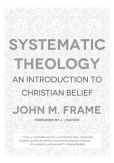
John Frame's Systematic Theology
Chapter 22 - Father, Son and Spirit
Frame focuses on the distinction and relationship of the Three Persons of the Trinity.
Sabellius and others in church hsitory have downplayed the distinction, making God one person who shows us 3 faces. This makes more sense rationally, but doesn't fit with Scripture like John 1:1-2; Rev 3:21; 7:10; John 17. The Three Persons are distinct.
Scripture speaks of the Spirit as a Person, and He acts like one. 2 Corinthians 3:17-18 and Romans 8:9-11 seem to speak of the Spirit and Christ as the same Person ("Spirit of Christ"). But they speak of the Lord more generally as God, and of the work of the Spirit and of Christ as closely linked. Other texts distinguish between Son and Spirit (John 14:16).
The Persons indwell and glorify each other. The Father is in Me, and I in the Father, Jesus says. They defer to one another (John 16:7; 3:35). And we are brought into this fellowship, the Son serving US, and making us one with Him (John 17:22). Not in a way that blurs the Creator-creature distinction, of course.
The Bible doesn't get more technical than this, but it's important for us to avoid error, so here goes. God is one being, substance, essence or nature. He is three persons or subsistences. Don't insist on the details of definitions of these words too closely, as opposed to Scripture. They can be used to express heresy or orthodoxy, depending. The main thing is that God is one unity in one sense, and a plurality of three in another sense. Father, Son and Spirit are each God, and Father is not Son or Spirit. Anselm actually said that in Scripture there are "Three I-know-not-whats"!
Augustine and Aquinas both emphasize relationships between the Persons as definitive of God's essence. This can easily land you in modalism: God is really one, but as we understand Him to relate differently to us or Himself, He is Three. No, no! Each Person can be described differently (Father as unbegotten, Son as begotten, for example), but each is God, Who is one being without multiple parts. We shouldn't call this irrational or contradictory, but it is highly mysterious and we are quick to admit we don't know how this works together.
We can distinguish the Trinity as ontological (what God is in Himself) and as economic (how God relates to His creation).
The Son is begotten of the Father (John 1:18), but we know more what this does NOT mean than what it does. Human begetting involves sex and time, which are out. The Son has no origin or cause, and the Father doesn't maintain His existence in a dependent relationship, either. It isn't His divine nature that is begotten. The best choice is His Sonship is generated by the Father. We can't say what this means for sure.
We're just as unsure about the Spirit eternally proceeding from the Father. John 15:26 Jesus uses this word, but it's really about sending the Spirit to us in history, probably not a description of the Father-Spirit relationship from eternity. But the idea of Spirit as breath, coming out of God (God-breathed Scripture, for example) points in that direction.
A controversy arose when the Western churches added to the Nicene Creed that the Spirit proceeds from the Son, as well as from the Father. This is probably valid, reasoning by analogy from John 15:26. But the West shouldn't have done it without the consent of the whole church, and it wasn't worth splitting over.
The Father seems to have a primacy of role, but no Person of the Trinity is subordinate in nature to the others. They voluntarily defer and submit to one another. This is a divine attribute, it seems! We are called to submit to God and serve others, as Christ did.
There are two main ways to illustrate the Trinity.
1. Psychologically, as one mind with multiple aspects: knower, thing known, and the knowledge. Or, lover, beloved and the love itself. This starts with unity and seeks plurality in it. The Western approach of Augustine.
2. Socially, as three persons with a unity so deep it is of the essence. There are three centers of consciousness that converse, love, submit, etc. This starts with plurality and seeks unity from it. The Eastern approach of the Cappodocian Fathers.
Trinitarian doctrine isn't for speculation or curiosity, but to make us better Christians. It shows we are to worship Jesus and the Spirit as our Savior and Sanctifier. Only God can save us, and Jesus is God our Savior. God does not need a world to love - He is loving within Himself. But He can directly touch and save His world Himself - He did as Son and Spirit.
No comments:
Post a Comment